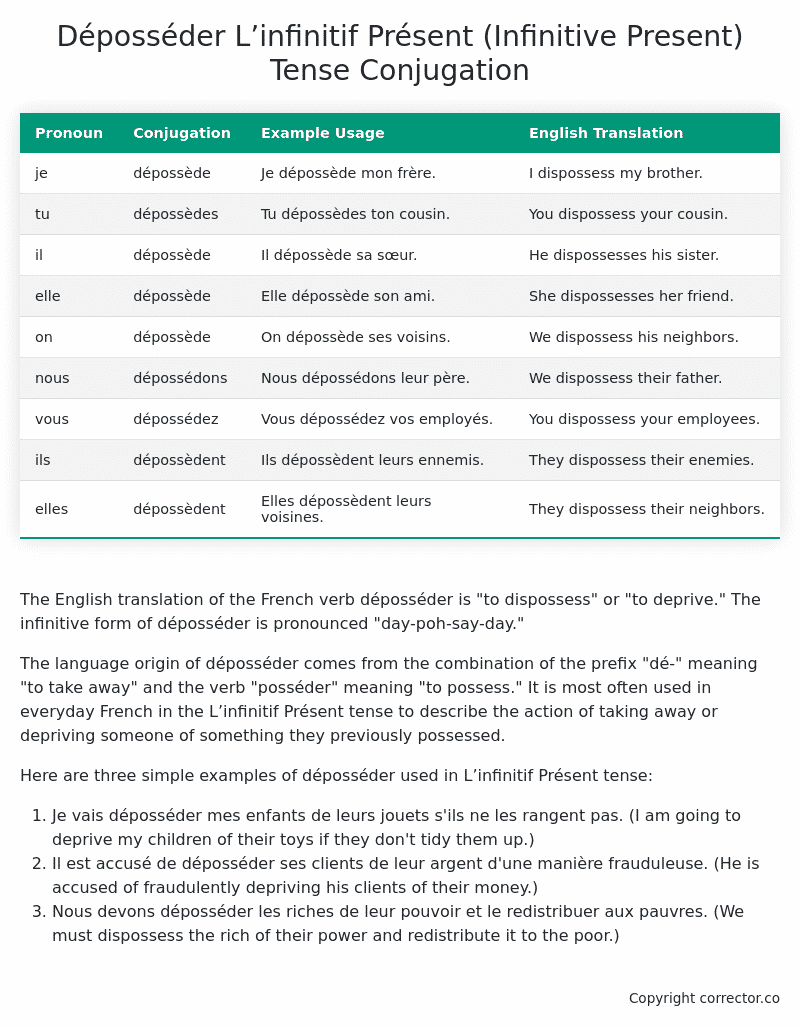L’infinitif Présent (Infinitive Present) Tense Conjugation of the French Verb déposséder
Introduction to the verb déposséder
The English translation of the French verb déposséder is “to dispossess” or “to deprive.” The infinitive form of déposséder is pronounced “day-poh-say-day.”
The language origin of déposséder comes from the combination of the prefix “dé-” meaning “to take away” and the verb “posséder” meaning “to possess.” It is most often used in everyday French in the L’infinitif Présent tense to describe the action of taking away or depriving someone of something they previously possessed.
Here are three simple examples of déposséder used in L’infinitif Présent tense:
- Je vais déposséder mes enfants de leurs jouets s’ils ne les rangent pas. (I am going to deprive my children of their toys if they don’t tidy them up.)
- Il est accusé de déposséder ses clients de leur argent d’une manière frauduleuse. (He is accused of fraudulently depriving his clients of their money.)
- Nous devons déposséder les riches de leur pouvoir et le redistribuer aux pauvres. (We must dispossess the rich of their power and redistribute it to the poor.)
Table of the L’infinitif Présent (Infinitive Present) Tense Conjugation of déposséder
| Pronoun | Conjugation | Example Usage | English Translation |
|---|---|---|---|
| je | dépossède | Je dépossède mon frère. | I dispossess my brother. |
| tu | dépossèdes | Tu dépossèdes ton cousin. | You dispossess your cousin. |
| il | dépossède | Il dépossède sa sœur. | He dispossesses his sister. |
| elle | dépossède | Elle dépossède son ami. | She dispossesses her friend. |
| on | dépossède | On dépossède ses voisins. | We dispossess his neighbors. |
| nous | dépossédons | Nous dépossédons leur père. | We dispossess their father. |
| vous | dépossédez | Vous dépossédez vos employés. | You dispossess your employees. |
| ils | dépossèdent | Ils dépossèdent leurs ennemis. | They dispossess their enemies. |
| elles | dépossèdent | Elles dépossèdent leurs voisines. | They dispossess their neighbors. |
Other Conjugations for Déposséder.
Le Present (Present Tense) Conjugation of the French Verb déposséder
Imparfait (Imperfect) Tense Conjugation of the French Verb déposséder
Passé Simple (Simple Past) Tense Conjugation of the French Verb déposséder
Passé Composé (Present Perfect) Tense Conjugation of the French Verb déposséder
Futur Simple (Simple Future) Tense Conjugation of the French Verb déposséder
Futur Proche (Near Future) Tense Conjugation of the French Verb déposséder
Plus-que-parfait (Pluperfect) Tense Conjugation of the French Verb déposséder
Passé Antérieur (Past Anterior) Tense Conjugation of the French Verb déposséder
Futur Antérieur (Future Anterior) Tense Conjugation of the French Verb déposséder
Subjonctif Présent (Subjunctive Present) Tense Conjugation of the French Verb déposséder
Subjonctif Passé (Subjunctive Past) Tense Conjugation of the French Verb déposséder
Subjonctif Imparfait (Subjunctive Imperfect) Tense Conjugation of the French Verb déposséder
Subjonctif Plus-que-parfait (Subjunctive Pluperfect) Tense Conjugation of the French Verb déposséder
Conditionnel Présent (Conditional Present) Tense Conjugation of the French Verb déposséder
Conditionnel Passé (Conditional Past) Tense Conjugation of the French Verb déposséder
L’impératif Présent (Imperative Present) Tense Conjugation of the French Verb déposséder
L’infinitif Présent (Infinitive Present) Tense Conjugation of the French Verb déposséder (this article)
Struggling with French verbs or the language in general? Why not use our free French Grammar Checker – no registration required!
Get a FREE Download Study Sheet of this Conjugation 🔥
Simply right click the image below, click “save image” and get your free reference for the déposséder L’infinitif Présent tense conjugation!

Déposséder – About the French L’infinitif Présent (Infinitive Present) Tense
Forming the Infinitive Present
Common Everyday Usage Patterns
As a Verb’s Dictionary Form
After Modal Verbs
As an Imperative
In Infinitive Clauses
Interactions with Other Tenses
Present Tense
Future Tense
Conditional Tense
Passé Composé
Imperfect Tense
Subjunctive and Conditional Moods
Summary
Want More?
I hope you enjoyed this article on the verb déposséder. Still in a learning mood? Check out another TOTALLY random French verb conjugation!


